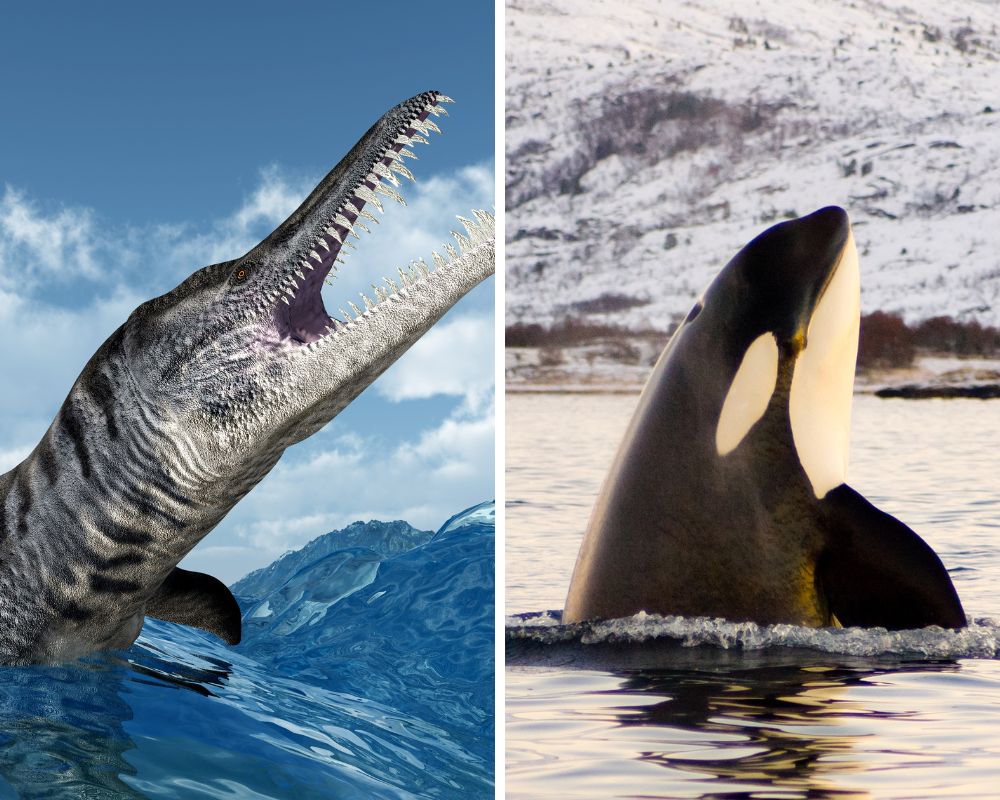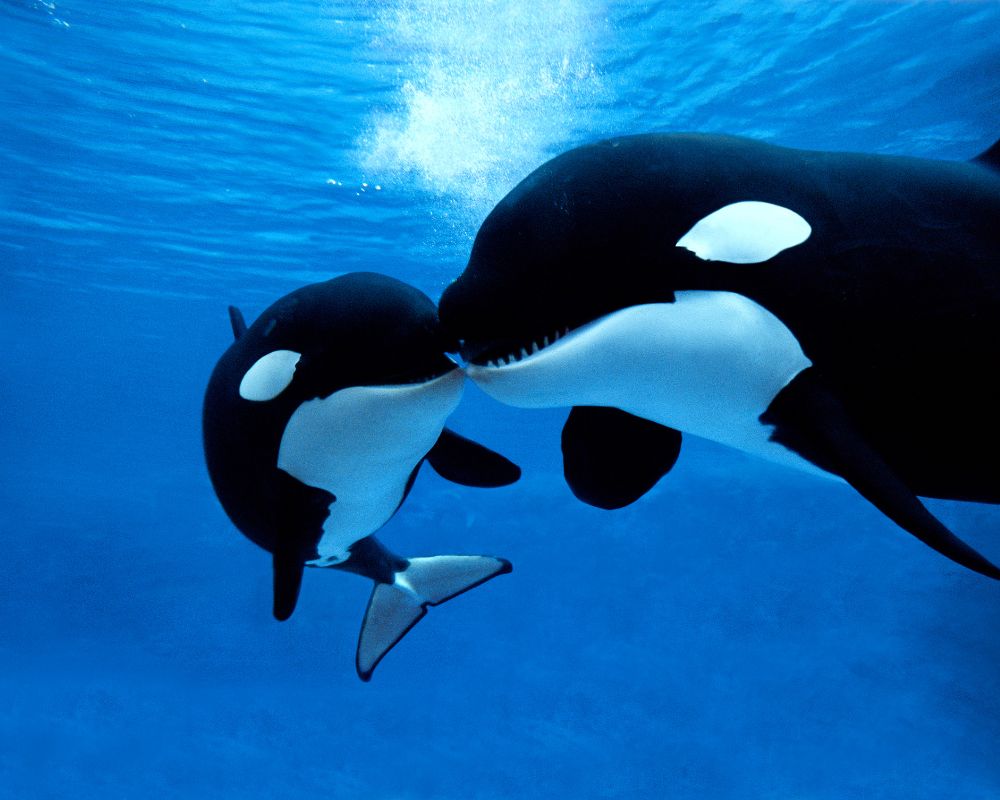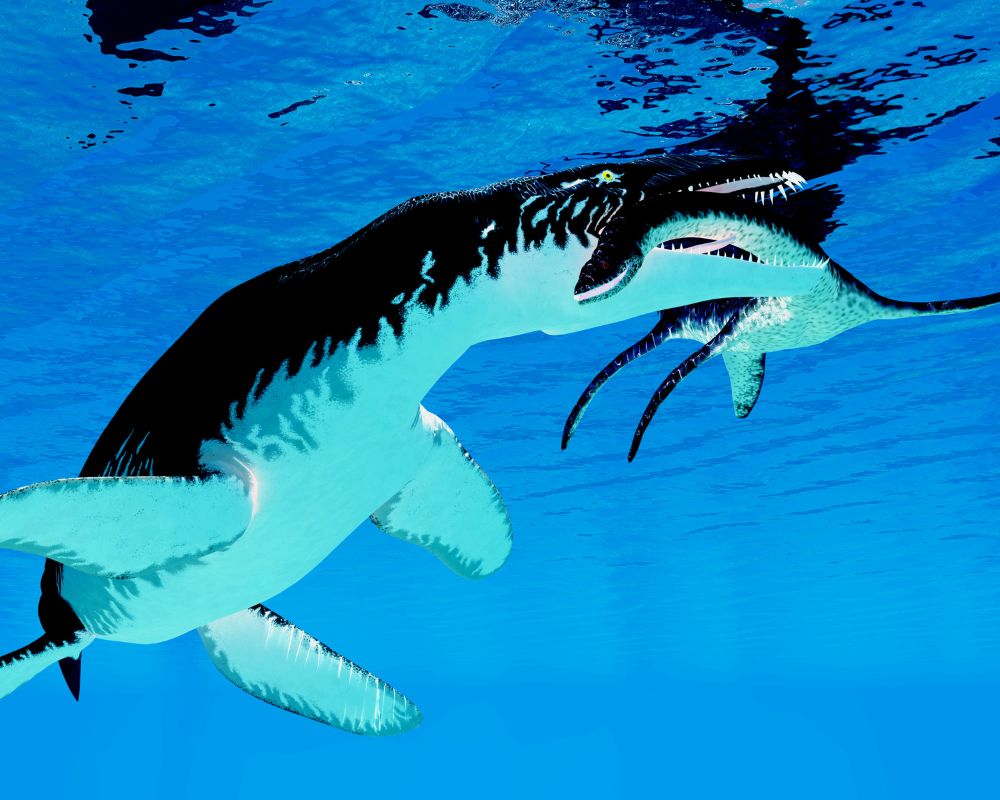Today, no living sea creatures can take down an Orca. But what about a prehistoric Liopluerodon? While the Liopluerodon had a mighty bite, it was still no match for the speed and aggression of the Orca.
Table of Contents
Battle Facts about Liopleurodon vs. Orca

| Name | Liopleurodon, (Liopleurodon ferox) western smooth-sided teeth | Orca, (Orcinus orca) Killer Whale |
| Size | 23 feet long, 3,700 pounds | 30 feet long, 8,000-16,000 pounds |
| Speed | 6.2 miles per hour | 35 miles per hour |
| Offense | A powerful bite, can maneuver quickly in the water | Very fast, powerful bite |
| Defense | Great sense of smell | Very large body, quick speeds, sharp senses |
| Endurance and Behavior | Slowly stalks prey before attacking | Very aggressive and fast |
The Liopleurodon was a ferocious marine reptile that lived in the seas of Europe during the late Cretaceous period.
While it was much smaller and slower than an Orca, it had a bite that was even more deadly than a T-Rex or a Velociraptor. These Plesiosaurs were deadly but were they ferocious enough to take down a mighty Orca?
What is the size of an Orca?

On average, Orcas grow up to 30 feet long and can weigh up to 16,000 pounds. To put that into perfective, they grow as big as two basketball hoops and weigh about as much as a Tyrannosaurus Rex!
While it’s a massive sea monster, it can still reach up to 35 MPH in the water. If you were a sea creature in the sights of an Orca, you were in trouble. Even Great White Sharks and Blue Whales know better than to mess with an Orca.
What was the size of the Liopleurodon?

The Liopleurodon was the apex predator of Europe’s late Jurassic saltwater seas and measured around 23 feet long. Despite its long, crocodile-like frame, the Liopleurodon weighed about 3,700 pounds, nearly four times less than a full-grown orca.
As a Pliosaur, the Liopledurodon had a very long skull similar to a shark and used its razor-sharp teeth to rip into its prey.
Is there an animal stronger than Orca today?
In the ocean, the Orca is at the top of the food chain. This means no predators that swim the great seas can challenge a Killer Whale. While it may be king of the high seas, it’s not the strongest animal on the planet. If you compare the overall strength of a modern-day Orca to any land mammal living today, the elephant is a much stronger creature.
How do Liopleurodon and Orca compare in strength?
Overall, the Orca is much stronger than a Lioleurodon. It’s bigger, has a massive body weight, and can swim much faster. But that doesn’t necessarily mean that it’s stronger than a Liopleurodon. The Liopleurodon has a much stronger bite than an Orca. An Orca has a bite force of around 14,000 pounds per square inch, about 2,000 pounds more than a T-Rex!
On the other hand, the Liopleurodon had a bite force of a whopping 33,000 pounds per square inch! It’s one of the deadliest bites of any creature, whether on the land or sea, to ever live on Earth. Sure, the Orca was stronger and faster, but if it found itself in the jaws of the Liopleurodon, it was in trouble.
Who would win a Liopleurodon vs. Orca battle?
The Orca would likely win against a Liopleurodon, but the battle would be close. Orcas are social creatures and often travel in pods. If a pod of Orcas surrounded a Liopleurodon, it was game over. However, while the Liopleurodon was weaker and slower, it was clever.
It was an ambush predator, meaning it lurked in the shadows waiting for the perfect moment to strike. A Liopleurodon could earn an edge in battle with a bite force almost four times as deadly as an Orca.
Overall, an Orca is a more deadly predator. It’s as if a Tyrannosaurus Rex lived in the ocean! And what makes the battle between the Lioppleurodon and the Ocra even scarier is that Orcas still swim in the oceans today!
